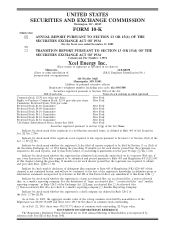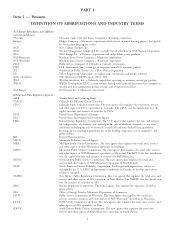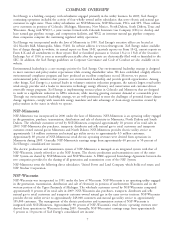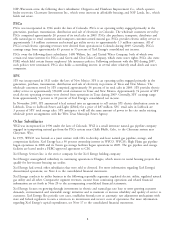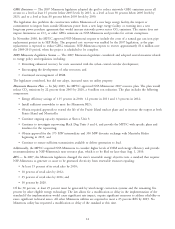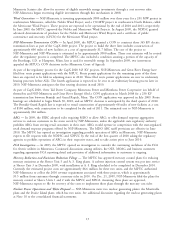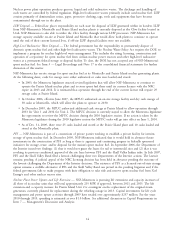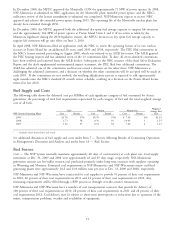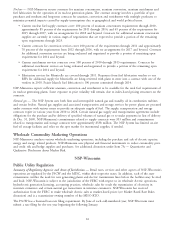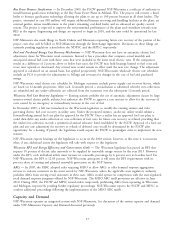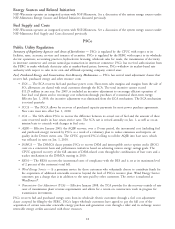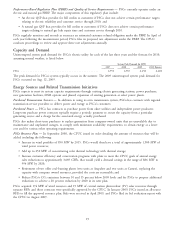Xcel Energy 2009 Annual Report Download - page 19
Download and view the complete annual report
Please find page 19 of the 2009 Xcel Energy annual report below. You can navigate through the pages in the report by either clicking on the pages listed below, or by using the keyword search tool below to find specific information within the annual report.ELECTRIC UTILITY OPERATIONS
Electric Utility Trends
Overview
Climate Change and Clean Energy — Like most other utilities, Xcel Energy is subject to a significant array of
environmental regulations. Further, there are significant future environmental regulations under consideration to
encourage the use of clean energy technologies and regulate emissions of GHGs to address climate change. Our
operating subsidiaries are subject to state RPS requirements which we believe they will be in a position to achieve by
the applicable state deadlines. Although the exact form and design of any federal RPS policy is uncertain at this time,
we believe that we will be well-positioned to meet a federal standard as well, although the ultimate design of any federal
policy could have a varied impact on each of our operating subsidiaries depending upon the energy efficiency and other
standards imposed. In addition, Xcel Energy’s electric generating facilities have been and are likely to be further subject
to climate change legislation introduced at either the state or federal level within the next few years. In 2009, the EPA
took a number of steps toward the regulation of GHGs under the CAA. By spring 2010, the EPA expects to
promulgate regulations to control GHGs from mobile sources. Thereafter, the EPA anticipates phasing-in permit
requirements and regulation of GHGs for large stationary sources, such as power plants, in calendar year 2011.
While Xcel Energy is not currently subject to state or federal limits on its GHG emissions, Xcel Energy has undertaken
a number of initiatives to prepare for climate change regulation and reduce our GHG emissions. These initiatives
include emission reduction programs, energy efficiency and conservation programs, renewable energy development and
technology exploration projects. Although the impact of climate change policy on Xcel Energy will depend on the
specifics of state and federal policies, legislation, and regulation, we believe that, based on prior state commission
practice, we would be granted the authority to recover the cost of these initiatives through rates.
Additional information regarding climate change and clean energy is presented in the Management’s Discussion and
Analysis section.
Utility Restructuring and Retail Competition — The FERC has continued with its efforts to promote more competitive
wholesale markets through open access transmission and other means. As a consequence, Xcel Energy’s utility
subsidiaries and their wholesale customers can purchase from competing wholesale suppliers and use the transmission
systems of the utility subsidiaries on a comparable basis to the utility subsidiaries’ to serve their native load. In 2008,
the FERC approved a MISO proposal to begin operation of a regional ASM in January 2009.
The FERC has approved the open access transmission planning processes for the Xcel Energy operating companies and
the RTOs serving the NSP-Minnesota, NSP-Wisconsin and SPS systems (MISO and SPP, respectively).
• NSP-Minnesota received MPUC approval in 2008 to construct three new 115 KV transmission lines in 2009 to
deliver additional wind generation even if NSP-Minnesota does not purchase the generation. Several additional
transmission expansion projects are pending final MPUC action, including the CapX 2020 expansion.
• PSCo is pursuing upgrades to its transmission system and the systems of neighboring utilities in order to
facilitate renewable energy expansion, in response to statutory changes enacted in 2007.
• SPS is also pursuing strengthening its transmission system internally to alleviate north and south congestion
within the Texas Panhandle and other lines to increase the transfer capability between the Texas Panhandle and
other electric systems in the SPP. Transmission expansion plans include 345 KV lines from Tuco, Texas to
Woodward, Okla.
In addition to utility-sponsored transmission expansion, several large ‘‘overlay’’ transmission projects have been proposed
to construct 765 KV transmission facilities through the service areas of the utility subsidiaries. It is not certain if or
when specific overlay projects may be constructed and placed in service.
One state served by Xcel Energy’s utility subsidiaries has implemented retail electric utility competition. In 2002, Texas
implemented retail competition, but it is presently limited to utilities within the ERCOT, which does not include SPS.
Under current law, SPS can file a plan to implement competition, subject to regulatory approval, in Texas. Local market
conditions and political realities must be considered in proposing the transition to competition. Xcel Energy has been
unable to develop a plan for the Texas Panhandle to move toward competition that would be in the best interests of its
customers. As a result, Xcel Energy does not plan to propose retail competition in the Texas Panhandle. New Mexico
repealed its legislation related to retail electric utility competition.
9




